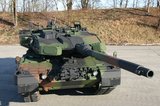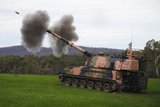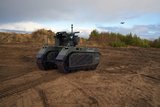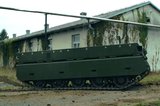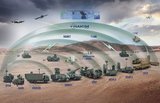Lockheed’s PAC-3 CRI in White Sands testing
Lockheed Martin's PAC-3 Cost Reduction Initiative (CRI) interceptor has successfully intercepted two tactical ballistic missile targets in a test at White Sands Missile Range, the company announced on 6 March.
The PAC-3 CRI intercepts support the US Army's Field Surveillance Program, ensuring the reliability and readiness of fielded PAC-3 missiles. The PAC-3 CRI and Missile Segment Enhancement are high-velocity interceptors that defend against incoming threats including tactical ballistic missiles, cruise missiles and aircraft.
The tests demonstrated the capability of the PAC-3 family of missiles and reconfirmed PAC-3 CRI's ability to detect, track and intercept incoming missiles while meeting fielded reliability requirements.
Eleven nations have procured the PAC-3 missile defence interceptor including the US, Germany, Kuwait, Japan, Qatar, South Korea, Saudi Arabia, Taiwan, Romania, the Netherlands and the United Arab Emirates.
Jay Pitman, vice president of PAC-3 programs at Lockheed Martin Missiles and Fire Control, said: ‘PAC-3 continues to be successful against today's evolving threats, and it remains the only combat proven hit-to-kill interceptor in the world. Today's global security environment demands reliable solutions. We expect PAC-3 interceptors to continue serving as an essential element in integrated, layered defence systems.
More from Land Warfare
-
![World Defense Show 2026: DOK-ING working on MV-8 variants and reveals specs ahead of Eurosatory]()
World Defense Show 2026: DOK-ING working on MV-8 variants and reveals specs ahead of Eurosatory
The Croatian company began the development of the MV-8 modular uncrewed platform in the early 2020s. Specifications for the vehicle were revealed to Shephard at World Defense Show 2026.
-
![World Defense Show 2026: Turkish and European industries will cooperate, says Aselsan boss]()
World Defense Show 2026: Turkish and European industries will cooperate, says Aselsan boss
Aselsan was formed 50 years ago in response to difficulties Turkey was facing in sourcing major systems internationally. While some challenges still remain, company president Ahmet Akyol believes a rapprochement is possible.
-
![World Defense Show 2026: Russia reveals details of new loitering munition]()
World Defense Show 2026: Russia reveals details of new loitering munition
The Kalashnikov RUS-PE cannister-launched man-portable loitering munition was displayed as a model at World Defense Show 2026 with a company official telling Shephard it was “in service and in low-rate initial production”.









